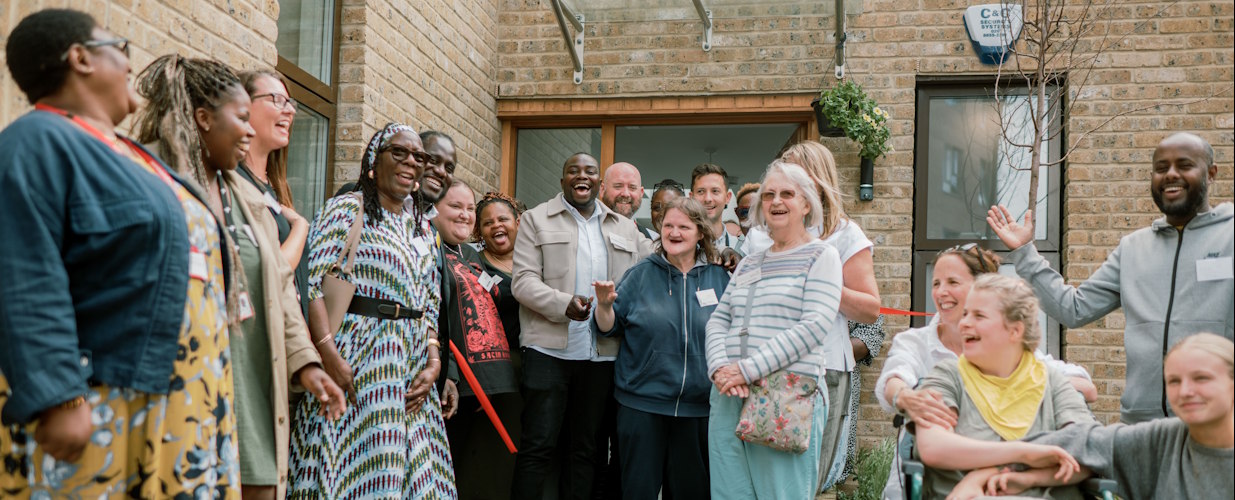Business cards
Work out how much cashback you could earn.
Financing a significant need to help create safe, sustainable homes that transform lives.
Read time: 3 mins Added: 16/04/25

With new funding from Lloyds, Golden Lane Housing (GLH) can maximise its support to society’s most vulnerable, by creating safe, sustainable homes that promote independence and dignity.
The UK is currently experiencing a severe shortage of appropriate housing stock, and research indicates a significant need for new specialist tenancies of this type.
GLH is at the forefront of addressing this need, providing high-quality, secure homes that enable people with a learning disability and autistic people to live independent and fulfilling lives. Many individuals they support face significant barriers to accessing appropriate housing, including those leaving long-stay hospitals, at risk of homelessness, or requiring specific adaptations to live safely. The organisation works to ensure that people with a learning disability and autistic people have the right home and support to thrive in their communities.
Most organisations use a mix of funding – predominantly private finance through secured lending, where they raise debt financing, grow the portfolio, and then use that incremental growth to refinance.
GLH approached Lloyds through a competitive tendering process. As Dave Brigden, Lloyds’ Head of Social and Supported Housing, explains, “We have provided an initial £10 million facility and have demonstrated our appetite to grow the relationship in future.”
Lloyds already had a significant existing footprint in social housing as the largest provider of finance for UK housing. However, this project was something new. As Dave Brigden explains, “Smaller, supported housing organisations may have been starved of mainstream capital. So, having a major institution like Lloyds provide funds to the sector is relatively new. We have benefited greatly from utilising advisory and consultants with experience in social finance.”
With approximately 1.4 million people with a learning disability or who are autistic in England, most of us know someone who needs the right home and support to live independently.
John Verge CEO, Golden Lane HousingBack in the nineties, the UK government introduced The National Health Service and Community Care Act 1990, which caused a shift towards a policy of care in the community. GLH was set up by the charity Mencap to meet the resulting demand for supported housing. Based in Manchester but operating across England, Wales and Northern Ireland, they have been a cornerstone of the sector ever since.
Despite financial challenges and a complex funding environment, GLH continues to grow. Initially, they adapted existing properties, but now also focus on new builds. They currently manage over 3,000 units, ranging from individual homes to clusters of flats and bungalows, all integrated within community hubs served by essential amenities to foster independence and inclusion.
GLH provides vital housing for people with a learning disability and autistic people, who make up around 30% of all long-term supported housing provision. As GLH CEO, John Verge, says, “With approximately 1.4 million people with a learning disability or who are autistic in England, most of us know someone who needs the right home and support to live independently.”
Referrals come primarily from local authority adult social care commissioners where homes are customised to individual needs. Increased qualification requirements for these services only make the issue more pressing, as John Verge, explains, “The biggest change over the last 20 years has been the greater complexity and higher level of support required by those referred into our housing.”
A Revolving Credit Facility (RCF) provides a flexible funding option that enables businesses to withdraw credit when required to pay for business activities and GLH took full advantage. Their facility was handled by the Growth and Structured Finance Team at Lloyds, recently set up to provide loans to small to medium-sized enterprises (SMEs) and mid-sized corporate clients.
As director James Long explained, “We work alongside the relationship managers, but have our own credit approval function and were tasked with being a bit more innovative and entrepreneurial."
He believes RCFs are an excellent option. "They’re very flexible – GLH get a committed line of credit so they can manage their own debt financing without constantly checking in with us. For the appropriate clients, this is exactly what we should be doing.”
Smaller, supported housing organisations may have been starved of mainstream capital. So, having a major institution like Lloyds provide funds to the sector is relatively new.
Dave Brigden Head of Social and Supported Housing, Business and Commercial Banking, LloydsGLH’s 10-year growth strategy will see them add 250 new units each year while also maintaining the existing stock and continuing their strategy to meet Net Zero by 2050.
John Verge is excited about the plans, “It’s always great to know you can house more people and we’re doing some really exciting developments with local authorities where they’ve identified the land and sources of capital contribution.”
He hopes it’s the start of an ongoing relationship. “Historically, we like to maintain good partnerships because, for small organisations like us, it takes time to build them. This is a really valuable sector and we’re delighted that Lloyds want to be involved.”
From Lloyds’ point of view, Relationship Manager Steven Atwell is also very positive. “We’re more than just a funder. Working with organisations like GLH is an opportunity to deliver really positive outcomes for those who need support.”
This is a really valuable sector and we’re delighted that Lloyds want to be involved.
John Verge CEO, Golden Lane Housing